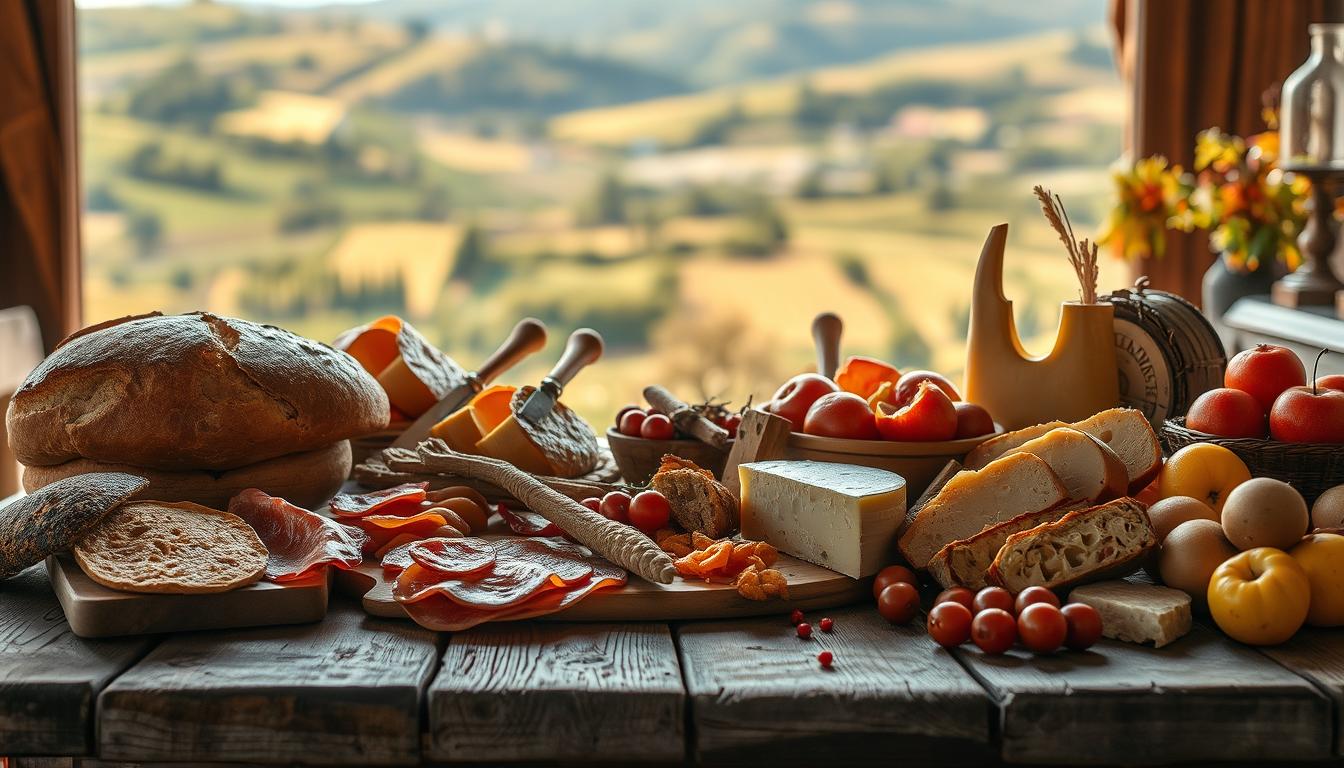Artisanal food production in Europe is a shining example of traditional food making. It showcases a rich culinary heritage. This method focuses on quality and authenticity, bringing out the unique flavours of European food.
There’s a growing interest in local traditions, making artisanal food more popular. It’s a welcome change from the uniform taste of mass-produced foods. Countries across Europe are showing how traditional methods create special culinary experiences.
This highlights a growing love for craftsmanship and heritage in our food. It’s a beautiful way to connect with our past through the food we eat.
Understanding Artisanal Food Production
Artisanal food production is all about quality, craftsmanship, and tradition. It’s made on a small scale, using old techniques, and focuses on local ingredients. These foods often share the story of where they come from, showing off the culture and heritage of their area.
Definition and Characteristics
Artisanal food is made by hand, in small amounts, and with a focus on fresh, quality ingredients. It’s different from mass-produced food. Artisanal items are crafted in small batches, which means more care goes into each one. This care helps keep the food’s true taste and authenticity.
The Rise of Artisanal Food Trends
Artisanal food trends have grown a lot in Europe recently. People want real, authentic food in their diets. They’re looking for local recipes and old ways of making food that connect them to their heritage. Farmers’ markets and food fairs are where these foods are celebrated, making food culture more lively.
Benefits of Artisanal Methods
Traditional food methods offer many benefits today. Artisanal food tastes better, with flavours that mass-produced food can’t match. It’s also better for the planet, as it often uses local ingredients, cutting down on emissions and supporting local businesses. This helps build a strong community and brings people closer to the food they eat.
The Art of Crafting Artisan Products
In the world of artisanal food, our techniques are key to authenticity. Traditional methods have been passed down for generations. They show our dedication to food craftsmanship.
These methods improve the taste and texture of our products. They also keep alive the cultural heritage of different places.
Traditional Techniques
Hand-making cheese, making sourdough bread, and curing meats are traditional skills. They show great skill and tradition. Each step needs careful attention to detail.
For example, sourdough bread’s unique taste comes from slow fermentation. Cheese-making needs precise temperatures and timing for the right texture and flavour.
Modern Innovations
Modern food innovations mix tradition with technology. Producers use advanced tools to improve quality while keeping traditional values. Digital temperature monitoring and automation help keep things consistent and efficient.
Artisans like those at BrewDog show how the food industry evolves. They use new techniques with traditional recipes. This shows how tradition and innovation can go hand in hand.
Regional Varieties in European Artisanal Foods
European artisanal foods are incredibly diverse, thanks to regional traditions. Each country offers unique cheeses, dairy products, bread types, and charcuterie. These specialities show the craftsmanship and cultural pride of artisans.
Celebrated Cheese and Dairy Products
France is famous for its cheeses like Camembert and Roquefort. These are made using old techniques. Italy is known for Parmigiano Reggiano and mozzarella, with their fresh tastes.
In the UK, Cheddar and Stilton cheeses are highlights. Local dairies focus on traditional methods to keep things authentic.
Bread and Baked Goods
Bread types in Europe show the region’s culinary variety. The French baguette is a classic, with its crispy outside and soft inside. Italy’s focaccia is a favourite, often topped with tasty ingredients.
The UK is proud of its sourdough bread. It adds an artisanal touch to our meals, thanks to quality ingredients and fermentation.
Charcuterie Specialties
Charcuterie products vary by region in Europe. Spain’s jamón ibérico is a must-try, with its rich taste. French pâtés offer a mix of flavours and textures.
Italian salami, like soppressata, adds variety. It shows the skill and diversity in charcuterie making.
Sustainability in Artisanal Food Production
Sustainability is key in artisanal food making. It shows how food systems can grow while caring for the planet. By choosing local food, makers help nearby farmers. This helps the local economy and supports biodiversity.
Local Sourcing and Farmers
Local food connects us to the farmers who grow our favourite ingredients. It supports traditional farming and helps the land. This way, we enjoy fresh, organic food that tastes like the region.
Environmental Impact
Supporting local food has big environmental wins. Artisanal makers use eco-friendly farming like crop rotation. This keeps the soil healthy and saves resources. It shows our food choices can make the planet better for the future.
The Role of Artisanal Food Producers
Artisanal food producers are key to our local economies. They create jobs and keep regional flavours alive. Their role goes beyond just making money; they are essential to our communities.
Small Business Importance
Small food producers are the heart of artisanal economics. They focus on quality, using traditional methods to make unique products. This approach creates jobs and supports families.
When we buy from these small businesses, we help our local economy. This money stays in our communities, promoting sustainability.
Community Engagement
Artisanal food producers know the value of community support. They sell at local markets, building trust with customers. They also teach about food production and local ingredients.
Working together with other small businesses, they strengthen community ties. This shows the benefits of supporting local food. It builds loyalty among consumers, keeping the community spirit alive.
Challenges Facing Artisanal Producers
Artisanal producers face many challenges that make it hard for them to succeed. It’s important for them to overcome these challenges to keep their products of high quality and true to their origins.
Market Competition with Mass Producers
The food market is now mostly filled with mass producers who sell cheaply because they make lots. This makes it tough for artisanal producers to compete on price while keeping their quality high. Even though mass-produced foods are cheaper, they often don’t have the special tastes and unique qualities of artisan goods.
So, artisanal producers need to find ways to stand out. They must tell the stories behind their products and highlight the care and skill that goes into making them. This helps them attract and keep customers who value these qualities.
Regulatory Compliance
Following food regulations is also a big challenge for artisanal producers. They have to deal with many health and safety rules, as well as labelling laws. These rules can be hard to understand and follow, which can be overwhelming for small businesses.
It’s not just about following the law; it’s also about keeping customers’ trust. Artisanal producers must pay close attention to these rules to ensure their products are safe and meet legal standards.
| Challenge | Description | Impact on Artisanal Producers |
|---|---|---|
| Market Competition | Mass producers dominate with lower prices and wider distribution. | Strain on pricing and market share for artisan goods. |
| Regulatory Compliance | Strict health, safety, and labelling requirements. | Resource-intensive, may hinder operational efficiency. |
The Intersection of Artisanal Production and Tourism
Artisanal food production and tourism go hand in hand. Food tourism loves local tastes, skills, and traditions. This makes artisanal foods key for those wanting real culinary adventures.
At artisan food festivals, local artisans show off their work. This boosts regional pride and draws in visitors eager to try new foods.
Food Festivals and Events
Artisan food festivals are lively, celebrating local foods. They let artisans meet buyers, show off their products, and share unique tastes. Food lovers dive into the world of artisanal foods, learning about the making and stories behind each item.
This connection enriches food tourism. It lets people see the hard work and skill in making these foods.
Culinary Tours and Experiences
Culinary tours add a new layer to food tourism. They let visitors get up close to the artisans. People can join workshops, learn about making quality products, and see the process.
These tours teach about artisan craftsmanship. They also leave lasting memories and deepen the love for the food we eat.
| Festival/Event Name | Location | Date | Highlights |
|---|---|---|---|
| Cheese Lovers Festival | Bristol | April 15-17 | Artisan cheese tastings, workshops, and cheese-making demonstrations |
| Culinary Adventure Week | Edinburgh | September 1-7 | Local food tours, farm visits, and cooking classes with chefs |
| Artisan Bread Festival | London | May 21-23 | Baking workshops, bread tastings, and masterclasses on traditional baking methods |
Economic Impact of Artisanal Food Production
Artisanal food production does more than just make tasty products. It helps local economies by creating jobs and boosting economic activity. We’ll look into how these businesses create jobs and contribute to the national GDP.
Job Creation in Local Economies
Artisanal food production can create many jobs in local economies. These businesses need skilled workers, which helps grow jobs in production, marketing, and distribution. They support local economies by keeping jobs in the communities where products are made.
Smaller businesses like bakeries, cheese makers, and vineyards not only hire people but also boost the local economy. As they grow, they attract more customers. This leads to more jobs in hospitality and retail.
Contribution to GDP
The role of artisanal food producers in the GDP is huge. By focusing on local production and using local ingredients, they help the economy grow. Their unique products often get higher prices, which increases their economic impact.
Also, the artisanal food sector supports sustainable practices. This makes local economies more resilient. Studies show that areas with strong artisanal food sectors have better economic performance. They have higher GDP compared to areas focused on industrial mass production.
| Artisanal Sector | Job Creation | GDP Contribution |
|---|---|---|
| Bakeries | 20-30 jobs | £500,000 – £1 million |
| Cheese Makers | 15-25 jobs | £300,000 – £750,000 |
| Vineyards | 10-15 jobs | £250,000 – £600,000 |
The Future of Artisanal Food Production
The world of artisanal food is changing fast. This is because of new tastes and big challenges. We see new trends like plant-based foods and being green. These changes help meet different tastes and care for our planet.
Emerging Trends and Innovations
Plant-based foods are getting more popular. Makers are using top ingredients to meet many tastes. They also focus on local farming, linking food to where it’s made.
Tech in Artisan Production
Technology is playing a big role in making food. It helps keep food fresh and reach more people. Things like smart packaging and data help a lot. This mix of old and new ways keeps traditions alive while reaching new heights.
LerriHost: Supporting Artisanal Businesses
The artisanal sector is growing fast, and LerriHost is right at the heart of it. We offer top-notch company formation services for new businesses in the food production area. Our goal is to make setting up a business easy, so entrepreneurs can focus on their craft.
Company Formation Services
Starting an artisanal business means dealing with lots of rules and paperwork. Our company formation services make this easier. We help new businesses get off the ground in tough markets. We make sure everything is legal, so our clients can start their journey without worry.
Nominee Services Overview
We also offer nominee services for extra privacy and support. This is great for artisanal entrepreneurs who want to keep a low profile but follow the law. With our help, they can grow their business, knowing their interests are safe.
Financial Services for Artisanal Entrepreneurs
Financial services are key for artisanal food businesses to thrive. They help with banking and payment processing, making things run smoothly. We look at how these services help with managing money and planning finances for these unique businesses.
Banking and Payment Processing Assistance
Good banking solutions are vital for managing money well. Food businesses get special accounts with low fees and flexible overdrafts. Payment services that accept many types of payments make transactions easy.
Choosing the right banking helps with smooth money flow. This makes operations better and customer service top-notch.
Importance of Financial Planning
Good financial planning is key for growth. We help food businesses with strategies for managing costs, taxes, and investments. This planning helps with budgeting and prepares for unexpected issues.
With a solid plan, businesses can handle market changes. This ensures they stay strong in a competitive field.
Optimising Your Online Presence
For artisanal food brands, having a strong online presence is key in today’s digital world. By focusing on SEO, these businesses can be seen by more people. We think using the right SEO strategies can really help artisanal producers grow.
SEO Strategies for Artisanal Brands
Creating custom SEO plans is vital for more visitors to artisanal food sites. Here are some good ways to do it:
- Keyword Research: Finding the right keywords helps our content match what people are looking for.
- Quality Content Creation: Writing engaging blogs and recipes builds trust and improves the user experience.
- Mobile Optimisation: Making sure our site works well on mobiles helps reach more users.
- Local SEO: Using local search terms helps us show up in local searches, making it easier for people to find us.
WordPress Website Design and Redesign
Using WordPress can really change how food brands look online. A good design can make customers more engaged and increase sales. The benefits of choosing WordPress include:
- Customisation Options: We can make designs that really show off the brand’s personality.
- Easy Navigation: A site that’s easy to use keeps visitors interested and on our site longer.
- SEO-Friendly: Many WordPress themes are built with SEO in mind, helping us get seen more.
- Integration of Plugins: Useful plugins can help with tracking, improving site speed, and more.
Ensuring Continuous Support for Artisanal Businesses
In the world of artisanal food, support is key. We help artisans by keeping their websites running smoothly. This lets them focus on making great food, without worrying about tech issues.
WordPress Maintenance Services
Keeping artisan websites safe and working is our goal. We do regular updates, backups, and security checks. This keeps customers happy and coming back.
Our WordPress services are made for food businesses. We handle the tech stuff, so artisans can keep doing what they love.
Reliable WordPress Web Hosting
Good hosting is vital for artisan sites. It makes sure sites are fast and always up. This helps food businesses grow by giving them a strong online base.
We offer expert hosting to support each business. This way, they can thrive in today’s fast-paced market.
Networking Opportunities for Artisanal Producers
Networking is key for artisanal food businesses to grow. By working together, producers can find new resources and reach more people. This helps our visibility and supports the local economy.
Collaboration with Other Local Businesses
Working with other businesses can lead to great partnerships. We can promote each other’s products and reach more customers. Events like farmers’ markets are perfect for showing off our products.
For example, a cheese maker and a local bakery could team up for a tasting event. This brings both brands together and delights customers with special pairings.
Engaging with the Community
Connecting with the community is vital for food producers. By joining workshops or supporting local agriculture, we build strong relationships. This helps us understand what our customers want.
Through these activities, we get valuable feedback and build loyalty. People appreciate knowing who makes their food. Local outreach helps us meet our audience’s needs.
| Networking Strategy | Description | Benefits |
|---|---|---|
| Joint Promotions | Collaborating on marketing initiatives with local businesses. | Increased visibility and shared customer base. |
| Community Workshops | Hosting events to educate consumers on artisanal methods. | Strengthened community ties and brand loyalty. |
| Joint Events | Participating in local markets or food festivals together. | Broader exposure and enhanced customer interaction. |
Conclusion: The Value of Artisanal Food Production
Artisanal food production is key to keeping our culinary traditions alive. These producers focus on quality, making sure every product shows their skill and honesty. This effort not only makes our food better but also keeps local tastes alive.
Supporting local artisans helps grow a rich food culture. It lets us enjoy a wide range of flavours that connect us to our heritage. Choosing artisanal food helps local economies and brings people together.
Artisanal food is more than just food; it’s a story, a history, and a passion. It’s something that mass-produced food can’t match. Let’s keep supporting these talented producers, keeping our culinary traditions alive and bringing joy to our tables.







